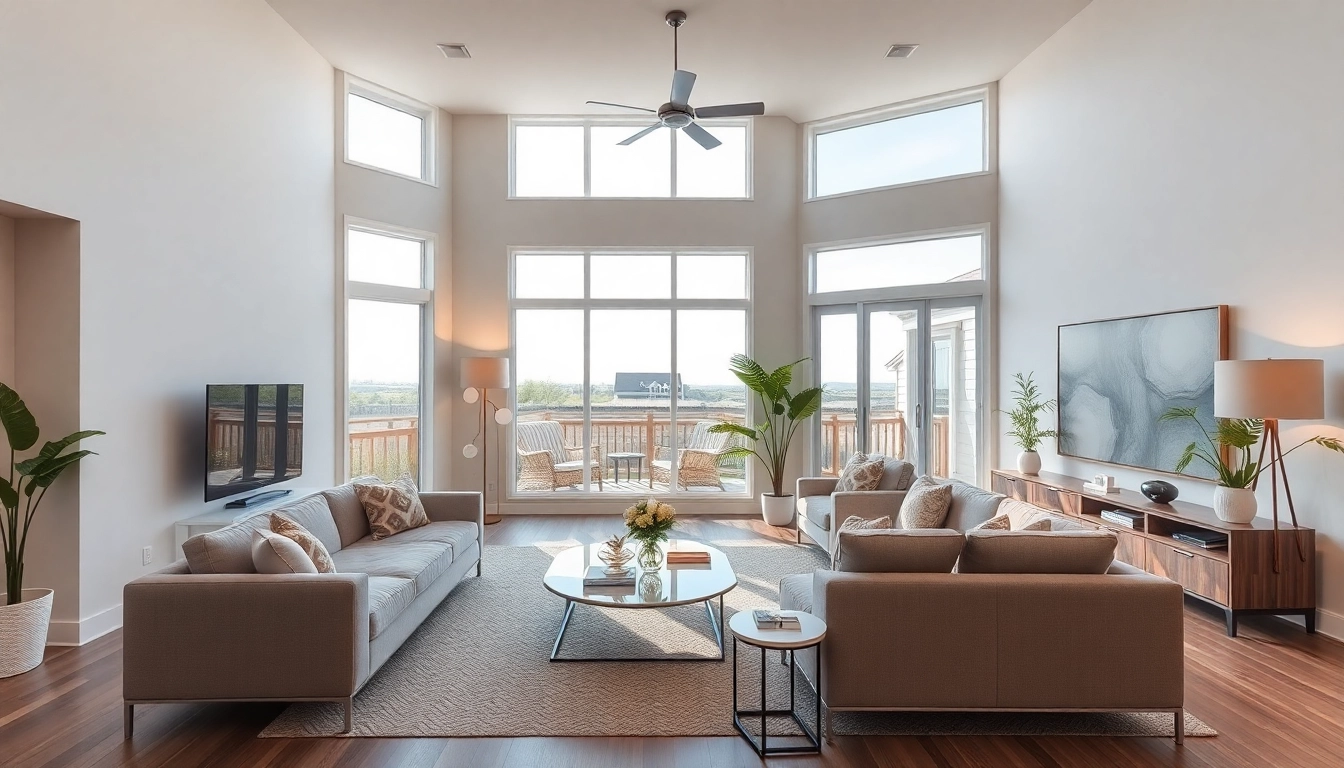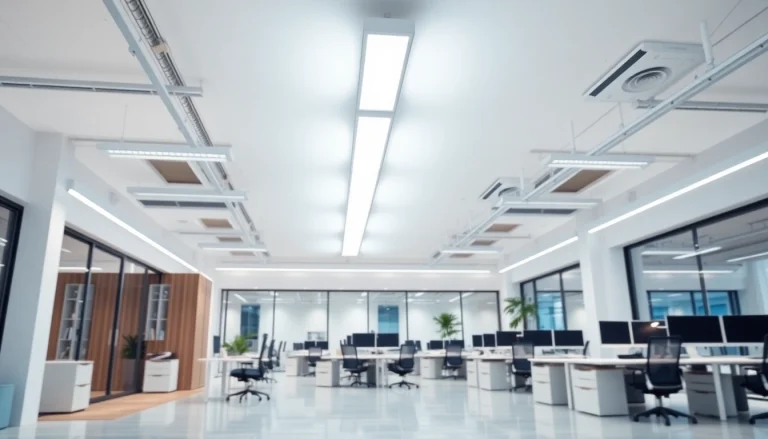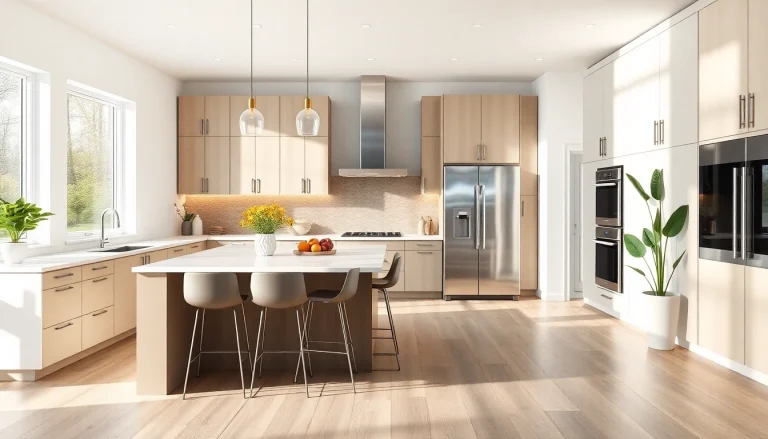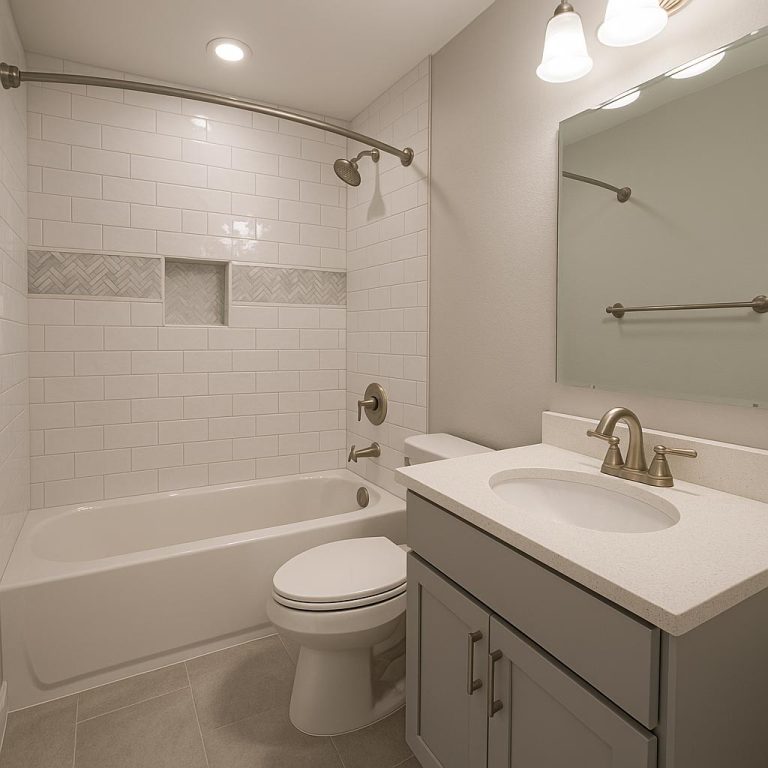
Understanding New Home Construction
What is New Home Construction?
New home construction refers to the process of building a brand-new residential home from the ground up. Unlike purchasing a pre-owned home, buying a new construction home means you are the first person to live in the house. This can often involve choosing custom elements and features, from the floor plan to the cabinetry, allowing buyers a level of personalization that is often not available with older homes. New home construction typically involves several stages, including planning, permitting, and the actual building process, providing a unique opportunity for buyers to see their homes evolve from concept to completion.
Benefits of Choosing New Construction
There are numerous advantages to opting for new home construction. Firstly, these homes are built with the latest materials and technology, often resulting in improved energy efficiency. Homeowners can enjoy lower utility bills and a reduced environmental footprint due to modern insulation, high-efficiency appliances, and sustainable building practices.
Additionally, newly built homes often come with warranties, protecting buyers from potential issues that may arise shortly after purchase. Buyers can also take advantage of customization options, ensuring the home meets their specific lifestyle needs and preferences.
Finally, purchasing a new construction home may provide significant resale value. As new neighborhoods are developed, property values can appreciate, particularly when communities offer amenities that attract future buyers, such as parks, schools, and recreational facilities.
Common Features of New Homes
New homes come with a range of modern amenities that appeal to many buyers. Open floor plans are increasingly popular, allowing for flexible use of space and enhanced natural light. Kitchens often feature high-end appliances, quartz or granite countertops, and large islands, making them the centerpiece for family gatherings and entertaining.
Smart home technology is another common feature, enabling homeowners to control lighting, security, and heating systems remotely. Energy-efficient windows, smart thermostats, and advanced insulation help minimize energy consumption while providing comfort year-round.
Additionally, new construction homes often incorporate outdoor living spaces, like patios and decks, and landscaping designed to enhance curb appeal, making these properties visually appealing from the moment you arrive.
Key Factors to Consider
Location and Community Features
Choosing the right location is crucial when considering new home construction. Factors like proximity to schools, workplaces, public transportation, and shopping centers significantly influence your daily life. Evaluate the neighborhood’s safety, the reputation of nearby schools, and the availability of recreational facilities like parks and sports complexes.
Community amenities can greatly enhance your living experience. Many new developments offer community pools, clubhouses, walking trails, and organized events that foster connections with neighbors. Researching local demographics is also essential to find an environment that aligns with your lifestyle and values.
Budgeting for Your New Home
Another critical consideration is budgeting for your new home construction. Beyond the initial purchase price, you need to factor in additional costs such as closing fees, property taxes, and homeowners insurance. Construction loans may be required, which differ from traditional mortgages in that they cover expenses incurred during the building process rather than a completed structure.
It’s advisable to allocate funds for unexpected expenses, commonly known as contingency funds. Building can sometimes encounter delays or unforeseen costs, so having a financial cushion can ease stress throughout the process. Seek advice from financial professionals or builders to arrive at a realistic budget that takes all potential costs into account.
Builder Reputation and Reliability
The reputation of the builder is a vital factor that can influence both the construction experience and the long-term quality of your new home. Research the builder’s history, read customer reviews, and ask for references to gauge reliability and quality of work. Understanding how responsive a builder is to concerns and issues is equally important. Builders with a solid track record are likely to provide superior craftsmanship and post-sale support.
Additionally, ensure the builder adheres to local building codes and regulations. This compliance is crucial not just for safety but also for the home’s value in the eyes of future buyers.
Finding New Home Construction Near You
Online Resources for New Home Searches
The internet is a valuable tool for locating new construction homes in your area. Websites like New Home Construction near me, Zillow, Realtor.com, and Trulia allow prospective buyers to filter searches according to their preferences, such as location, price, and home features.
Additionally, many builders have their own websites showcasing available properties, floor plans, and updates on upcoming developments. Utilizing social media platforms and community forums can provide insights on local builders and developments as well.
Utilizing Real Estate Agents
Involving a real estate agent experienced in new home construction can simplify the process. Agents can offer a wealth of knowledge regarding builders, the market trends in your desired area, and negotiate favorable terms on your behalf. They can help navigate the complexities of contracts and provide valuable local insights that might not be readily available online.
When engaging an agent, ensure they specialize in new construction and have established relationships with various builders. A well-connected agent can help you access exclusive listings and newly released homes.
Open Houses and Model Homes
Visiting open houses and model homes can provide you with a tangible sense of what new construction entails. Model homes showcase the builder’s design options and craftsmanship, providing a better understanding of layout, square footage, and the quality of finishes. Open houses also allow potential buyers to ask questions directly to the builders or agents, which can clarify the benefits and options of various properties.
Take notes during visits and don’t hesitate to ask for clarification on specifics like customization capabilities, the timeline for completion, and any additional fees associated with construction.
Financing Your New Home Construction
Understanding Financing Options
Financing the construction of a new home differs significantly from purchasing an existing home. While traditional mortgages cover a completed home, construction loans finance the home as it is built. There are two types of construction loans: construction-to-permanent loans, which convert to a traditional mortgage once building is complete, and stand-alone construction loans, which must be paid off upon project completion.
Many lenders require a larger down payment for construction loans—often 20% or more—along with a detailed budget and timeline prepared by the builder. Understanding your financing options and pre-qualifying can streamline the process and better prepare you for loan applications.
Working with Lenders
When it comes to financing your home construction, working with a lender experienced in construction loans is crucial. These lenders can provide guidance on the requirements needed for approval, as well as the range of loan types available. They will work with you to determine the best loan structure for your financial situation and the specifics of your construction plans.
Before moving forward, secure pre-approval to ensure a smoother transaction when you find the perfect property. Pre-approval not only helps identify your budget but also shows builders that you are a serious buyer.
Estimating Construction Costs
Estimating construction costs accurately is essential to prevent budget overruns. When budgeting for a new construction home, consider all components, including land costs, construction materials, labor, and even landscaping needs. Additionally, account for permits and inspection fees, which can vary significantly depending on location.
Consult with your builder for a detailed cost breakdown and ask to see examples of previous projects with similar specifications. This assessment will better inform your budget and help identify essential upgrades or modifications desired without breaking the bank.
Tips for a Smooth New Home Buying Experience
Communicating with Builders
Open communication with your builder can enhance your overall new home construction experience. Schedule regular meetings to discuss progress, modifications, and any concerns that may arise. Establishing a clear line of communication ensures transparency and helps you remain updated on the building process.
Documentation is key: keep a record of discussions, changes, and decisions made during the construction stages. Emails, meeting notes, and contracts should be organized for easy reference and clarification if disputes arise.
Staying Informed Throughout the Process
Engagement during the construction process is essential for a satisfactory outcome. Regular site visits will allow you to monitor progress and address concerns promptly. Maintaining a checklist of features and upgrades you agreed upon ensures nothing is overlooked prior to the final walkthrough.
Moreover, attending any community meetings or homeowner association sessions will enhance your understanding of the development and provide networking opportunities with neighbors who may have valuable insights or experiences to share.
Final Walkthrough and Closing Procedures
As the construction nears completion, a final walkthrough is an essential process to ensure everything meets your expectations. During this walkthrough, look for any discrepancies between the originally agreed features and what has been constructed. This is your opportunity to address minor repairs or adjustments with the builder before finalizing the transaction.
Closing procedures can vary by state, but typically include signing necessary documents, transferring funds, and finalizing your mortgage. Prepare for closing by ensuring all paperwork is complete and all funds are in your possession. Engaging a real estate attorney can help smooth these final steps if you require additional guidance.






